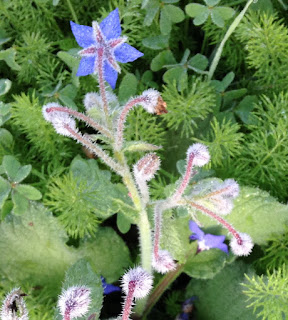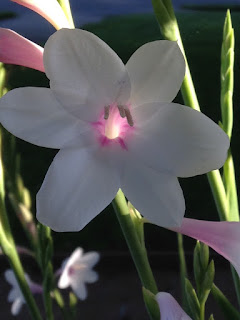As Advent begins, I am finding both comfort and inspiration in the book, A Touch of God, Eight Monastic Journeys, edited by Maria Boulding. This book was first published in 1982 by SPCK in London, England. One of the reasons that I enjoy the book so much is that the worldview of these monastics who lived, were educated, and eventually took their vows in Europe is different that mine. Yet, the struggles are much the same: the struggles about how to honor our calls, whatever they might be, both in times when our lives seem to be bearing the good fruit, and in times when we fear we are withering on the vine. Those times when we are confident in our choices, and those times when doubt seems to be the only voice crying in the wilderness of our heart. Yet, in each of these testimonials, there is are a reminder that if we keep going, our cagey egos will begin to lose their separatist grips. In this process, we can come to accept that regardless of how we are called to work our way through this world, we are first and foremost called to be in relationship. It is in relationship when we can begin to garner a new understanding that hope, peace, joy, and love are not just lovely candles lit in the four weeks before Christmas, but rather are the reality of who we are. Yes, the journey from ideals to experience can be rough going, but is one that is definitely worth taking. It is in this pilgrimage when we learn to be a friend to God, to one another, and to ourselves.
Dame Paula Fairle wrote in her chapter that she was born in 1940, so she was in mid-life when this book was published. She acknowledged that even then, sixteen years into her vocation, her personal prayers were “often far from inspiring,” but that she had learned to simply accept that most of her moments of deepest peace came outside of that time formally called prayer. She concluded her chapter with part of a beautiful prayer/poem that she wrote and that I would like to share. In it, we hear God yearning to be in relationship with us, and the love that eternally lights our way. It seems a fitting way to begin Advent. Let us remember that we are not running to cross the finish line in some sort of Herculean pre-Christmas marathon designed by retailers and marketers. Instead,we can take the time to explore the possibility that anytime a heart begins to open to the experience of love, Christ is born anew. Christmas can then be transformed from a deadline, into a way of being in this world and probably the next. This is the candle of hope I light today.
...and let the questing mind be still…
In the ground of your being I have my home,
so do not seek me in the world apart.
Within your spirit true communion lies.
You are no homeless stranger in a land afar,
No alien on a foreign shore,
for I am with you.
Do but be still and know that I am God.
I look upon the world with your dark eyes;
I feel the flowing air on your cool cheek.
I hear the twittering in the moving trees,
For with your senses I perceive.
I am with you, I am within you.
So do not turn away but come to rest in me.
Within you is our meeting place.
Be but still, and I will speak in silence
To your loving wayward heart.

















